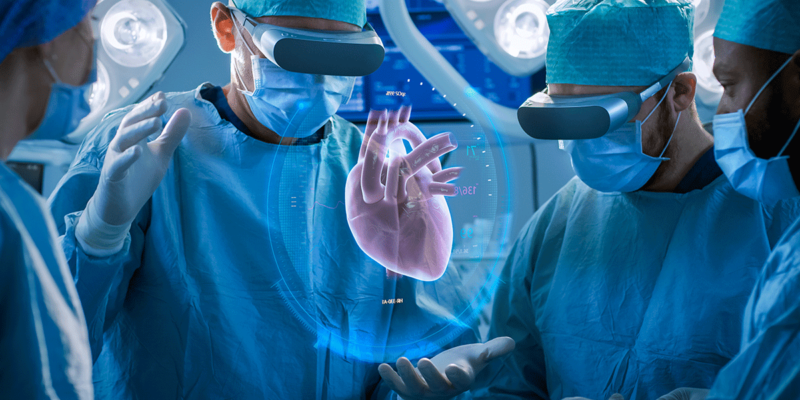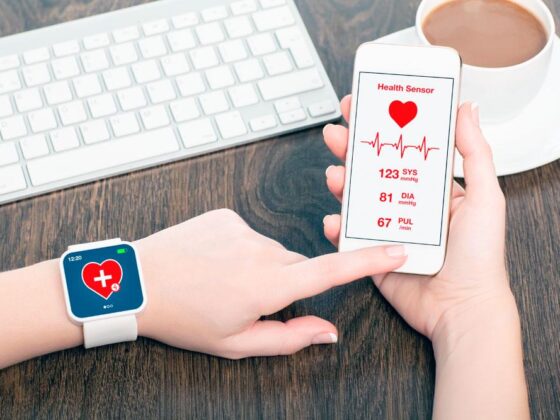In the bustling University of Florida Health Center, 32-year-old Michael Dieter lies in a hospital bed, awaiting a crucial lung transplant. But this is no ordinary hospital room – it’s a cutting-edge, high-tech intensive care unit (ICU) where every movement, every vital sign, and every facial expression is meticulously tracked and analyzed by an advanced artificial intelligence (AI) system.

Sensors and cameras blanket the room, monitoring Dieter’s every move. Over 350 gigabytes of data on his condition are fed into a central computer, where AI algorithms process the information in real-time. The goal? To provide doctors and nurses with invaluable insights that could help save Dieter’s life.
“This technology does take a big burden off the physicians and nurses and provide them time to actually engage in what we are here for – taking care of the patients,” explains Dr. John Torres, a medical correspondent for NBC News who has been closely following this pioneering project.
This high-tech experiment, funded by the National Institutes of Health, is entering its third year. Researchers are teaching the AI system to recognize complex features and emotions, from agitation to hunger, that could indicate a patient’s changing condition. The hope is that this AI-powered monitoring will soon be able to provide real-time health care recommendations to the medical staff, freeing them up to focus on hands-on patient care.
“We could look at the patient and go, ‘They’re moving a lot, there’s something going on there,’ or ‘Their face has a certain grimace they normally don’t have,'” says Torres. “Is it possible that it could tell you before I even know that I’m having problems? Yes, 100%.”
This revolutionary approach to hospital care is just the tip of the iceberg when it comes to the integration of AI and smart technology in the medical field. Across the country, hospitals are embracing these cutting-edge tools, transforming the way patients are monitored, diagnosed, and treated.
The Rise of AI-Powered Patient Monitoring
The University of Florida Health Center’s smart ICU is a prime example of how AI-powered patient monitoring is changing the game. By continuously tracking a patient’s vital signs, movements, and facial expressions, the AI system can detect subtle changes that could indicate a deteriorating condition.
“We will be able to decipher complex features, complex emotions like agitation or hunger,” Torres explains. “The hope is that AI will soon be able to provide real-time health care recommendations to the nurses and doctors.”
This type of proactive, AI-driven monitoring represents a significant shift from the traditional, reactive approach to hospital care. Instead of waiting for a patient to exhibit obvious signs of distress, the AI system can identify potential issues before they become critical.
“This technology does take a big burden off the physicians and nurses and provide them time to actually engage in what we are here for – taking care of the patients,” Torres says.
The potential benefits of this AI-powered patient monitoring are numerous. By catching problems early, it could lead to faster interventions and better patient outcomes. It could also help reduce the workload on doctors and nurses, allowing them to devote more time to hands-on care and personalized interactions with patients.
Embracing the AI Revolution in Hospitals
The University of Florida Health Center’s smart ICU is just one example of how hospitals across the country are embracing AI and smart technology. From predictive analytics to robotic surgery, these cutting-edge tools are transforming the medical landscape.
One area where AI is making a significant impact is in the realm of predictive analytics. By analyzing vast troves of patient data, AI algorithms can identify patterns and trends that could help predict the onset of certain medical conditions.
This type of predictive capability could revolutionize the way hospitals approach preventive care, allowing them to identify high-risk patients and implement targeted interventions before serious issues arise.
Another area where AI is making waves is in robotic surgery. Robotic surgical systems, such as the da Vinci Surgical System, are becoming increasingly common in hospitals. These advanced robots, guided by skilled surgeons, can perform complex procedures with unparalleled precision and dexterity.
The integration of AI and smart technology in hospitals is not limited to patient monitoring and surgical procedures. Hospitals are also exploring ways to use these tools to streamline administrative tasks, improve patient experience, and enhance overall efficiency.
For instance, some hospitals are using AI-powered chatbots to handle routine inquiries from patients, freeing up staff to focus on more complex tasks.
Additionally, hospitals are exploring the use of smart devices and wearables to enable remote patient monitoring, allowing patients to receive care from the comfort of their own homes.
The Human-AI Partnership in Healthcare
As hospitals continue to embrace AI and smart technology, one of the key questions that arises is: Will these new technologies ultimately replace the need for human medical professionals?
Dr. Torres believes that this is not the case. “They are very simplistic models compared to what our brains are doing, and I don’t think that we should be worried about humans being replaced anytime soon,” he says.
Instead, Torres envisions a future where AI and smart technology work hand-in-hand with human medical professionals, creating a new, holistic approach to healthcare.
“This technology does take a big burden off the physicians and nurses and provide them time to actually engage in what we are here for – taking care of the patients,” he explains.
By automating routine tasks and providing real-time insights, AI and smart technology can empower doctors and nurses to focus more on the human aspects of care, such as empathetic communication, personalized treatment plans, and hands-on interventions.
This human-AI partnership represents a significant shift in the way hospitals operate, transforming the traditional model of care into a more collaborative, data-driven approach.
Ethical Considerations and Challenges
As hospitals continue to embrace AI and smart technology, it’s crucial to address the ethical implications and potential challenges that come with these advancements.
One of the primary concerns is the issue of data privacy and security. The vast amounts of patient data being collected and processed by AI systems must be protected to ensure the confidentiality and integrity of sensitive medical information.
Another key challenge is the potential for bias and discrimination within AI algorithms. If the data used to train these systems is not representative or contains inherent biases, it can lead to unfair or inaccurate decision-making. Hospitals must work to ensure that their AI systems are designed with fairness and inclusivity in mind.
Additionally, there are concerns about the transparency and accountability of AI-powered decision-making in healthcare. As these systems become more complex, it can be difficult to understand the reasoning behind their recommendations, which can erode trust and create legal and ethical dilemmas.
To address these challenges, hospitals must adopt robust governance frameworks and collaborate with ethicists, policymakers, and the wider medical community to establish clear guidelines and best practices for the responsible use of AI and smart technology in healthcare.
The Future of Hospital Care: A Collaborative Approach
As the University of Florida Health Center’s smart ICU demonstrates, the integration of AI and smart technology in hospitals is poised to transform the way patients are monitored, diagnosed, and treated. By automating routine tasks, providing real-time insights, and empowering medical professionals to focus on personalized care, these cutting-edge tools are ushering in a new era of collaborative, data-driven healthcare.
However, the successful implementation of these technologies requires a delicate balance between innovation and ethical considerations. Hospitals must work diligently to address concerns around data privacy, algorithmic bias, and transparency, ensuring that the benefits of AI and smart technology are realized without compromising patient trust or compromising the fundamental human aspects of healthcare.
As we look to the future, it’s clear that the partnership between humans and machines will be crucial in shaping the next generation of hospital care. By embracing this collaborative approach, hospitals can harness the power of AI and smart technology to deliver better outcomes, enhance the patient experience, and empower medical professionals to provide the highest level of care.
The journey towards this future of hospital care is well underway, and the University of Florida Health Center’s smart ICU is just the beginning. As more hospitals follow suit and integrate these cutting-edge tools into their operations, the healthcare landscape is poised to undergo a profound transformation, one that promises to revolutionize the way we think about and deliver medical care.



